This is the June 19 edition of the People’s Daily. Notice the news at the upper right-hand corner. Concerning the recent earthquake in Sichuan, Xi Jinping “issued important instructions” (重要指示) and Premier Li Keqiang “gave his written comments,” or pishi (批示).
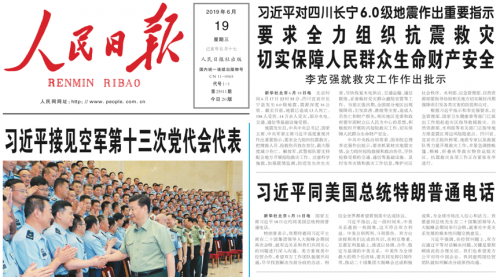
Translated into English, these two phrases, to “issue important instructions” and to “make written comments” may not sound altogether different. They might even sound to the untrained ear like very basic descriptions of the work of senior leaders. Aren’t they always issuing “important instructions,” and aren’t they constantly “making written comments”?
The phrases in fact have very important distinctions. But this was not always the case. And by looking at changes to how these two phrases have been used, we can gain a glimpse into the dynamics of power in China today.
In both cases, these phrases involve orders sent down from senior leaders to subordinates. “Written comments” refer to orders made to a document or report either presented by subordinates to senior leaders, or issued from senior levels. “Instructions,” by contrast, can sometimes also be spoken, and this helps to distinguish the two.
During the Hu Jintao era, “important instructions” could be issued of course by China’s top leader, Hu Jintao, but also by Premier Wen Jiabao and by other members of the Politburo Standing Committee.
We can see record of one of these cases below, in a report published in the People’s Daily on October 21, 2000, this relating to an earthquake in Yunnan province. The headline mentions that “Hu Jintao, Wen Jiabao and other central leading comrades” issued important instructions.
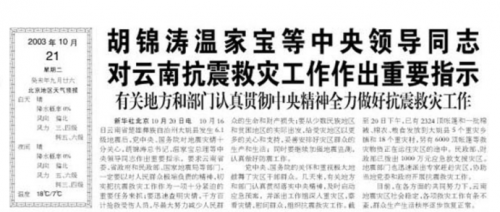
In the case of the 2008 Wenquan earthquake, Hu Jintao’s “important instructions” were reported in the People’s Daily. But the role of Premier Wen Jiabao as the one leading rescue and relief work on the front lines was made very clear.
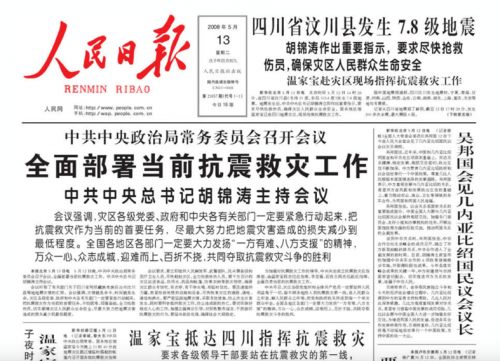
During the Wenquan earthquake, both Hu Jintao and Wen Jiabao issued “important instructions,” and are often mentioned together, as in this front-page report from May 28, 2008.
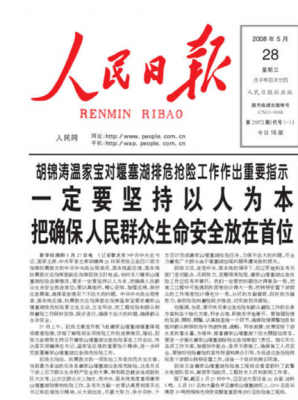
From 2003 to 2012 we can actually find this joint mention of “important instructions” quite frequently in the People’s Daily. We saw it in the case of earthquakes, in the case of floods and serious fires, in the case of mining accidents and serious cases of industrial pollution. Whenever, it seemed, there were sudden-breaking stories with potentially serious consequences, not just for those affected but for perceptions of the Party’s leadership and responsiveness, both Hu Jintao and Wen Jiabao were front and center, making “important instructions.”
The following is a front-page from the People’s Daily in 2001 that deals with serious drought in China’s southwest. Hu and Wen appear together right at the start of the headline, and again they have issued “important instructions.”
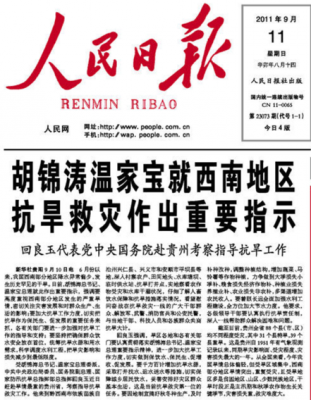
At the start of the Xi Jinping era, the Chinese Communist Party kept to its prior norms from the Hu-Wen era in mentions of “important instructions” on key breaking matters. We have cases from that time of both Xi Jinping and Li Keqing “making important instructions.”
The following report concerns rescue work happening in Tibet after a disastrous landslide occurred there in 2013. There is even mention in the small subhead that “Liu Yunshan, Zhang Gaoli etcetera” (meaning other members of the Politburo Standing Committee) also issued “instructions”.
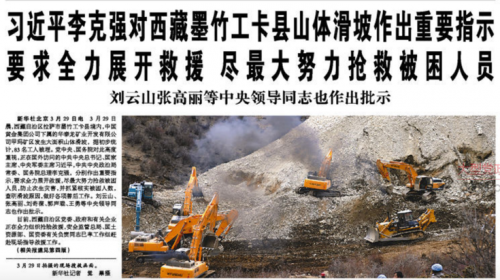
It is from this point, around the spring of 2013, that mentions of Xi Jinping jointly issuing important instructions vanish from the People’s Daily. When Sichuan’s Lushan (芦山) earthquake happened in April 2013, the newspaper made its first report of exclusive “important instructions” from Xi Jinping.
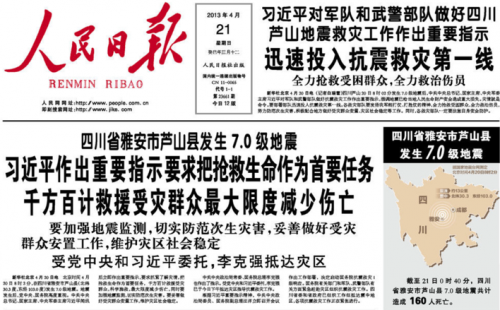
By 2015, we can clearly spot sharply distinguished use of the two phrases referring to “instructions” (指示) and “written comments” (批示). In January 2015, right at the new year, a major tragedy occurred in Shanghai as people were trampled in crowds along the Bund. Here was the front page of the People’s Daily.
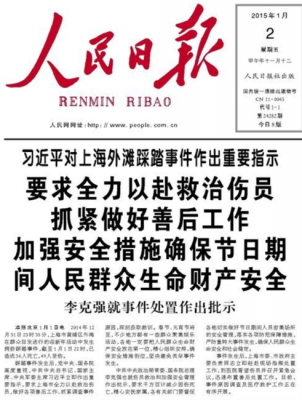
Here, Xi Jinping is clearly the one making the “instructions,” and he is doing so without mention of other members of the Politburo Standing Committee. In the subhead underneath the bold and dominating headline, we see mention of Li Keqiang, who has made “written comments.” In this case, the distinct usage of each term serves to set the top leader apart from his number two. By this time, we were already seeing clearly in China’s official Party discourse that Xi Jinping was being more and more boldly propagandized as an individual and distinct leader, and the gap in power between Xi and Li was clearly widening.
For a time, there were clear cases, however, of local and regional media failing to fully understand and reflect the growing gap between “instructions” and “written comments” and what this gap signified.
Official news releases by Xinhua News Agency in 2015 were already distinguishing clearly between Xi’s act of “instruction” and Li’s act of “written comment,” but sometimes newspapers still got it wrong. In the newspaper headline for this story on a serious fire in Henan province, the local Dali Daily in Yunnan, still reported that “Xi Jinping and Li Keqiang” had issued “important instructions.”
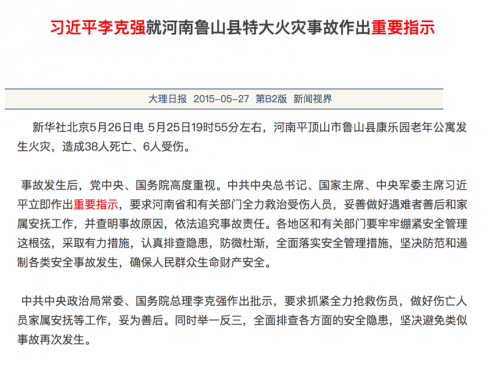
Clearly, this local paper hadn’t yet fully understood that Li Keqiang’s role was not at all like that of Wen Jiabao in the previous era, and that it was policy at Party media to not have Li issuing “important instructions” alongside the General Secretary.
The new norm now is for the general secretary to issue “important instructions,” and for the premier to “make written comments.” The issuing of “important instructions” has now fully become a special right and privilege of Xi Jinping himself.
Frivolous though it may seem to some, this is much more than a word game. It reflects the political norms of Xi Jinping, and it goes to the very heart of Chinese politics today.

David Bandurski
CMP Director



















